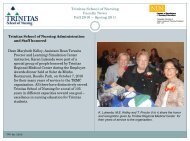Exclusive Interview⦠- Trinitas Hospital
Exclusive Interview⦠- Trinitas Hospital
Exclusive Interview⦠- Trinitas Hospital
- No tags were found...
You also want an ePaper? Increase the reach of your titles
YUMPU automatically turns print PDFs into web optimized ePapers that Google loves.
People can work out their grief in avariety of ways, says Dr. Neary-Ludmer.Writing a journal, participating in abereavement support group, seeking counselingare just a few of the ways to moveforward. Some people take comfort in ritualsand ceremonies and other things spiritual.Positive ways of moving forward canbe found in celebrating the person’s life.By doing so, the person grieving can eventuallydo new things, make new friendsand create new traditions.If a person suffers the loss of a job, heor she may experience feelings very similarto grief associated with death.“The individual grieves for the loss ofloyalty by the employer, loss of their identityand status in life,” Dr. Neary-Ludmernotes. “If the situation does not improve,and/or the individual fails to make a satisfactoryadjustment, depression may set in.These individuals need support from familyand friends.”Grief is a normal aspect of life that canaffect people of all ages. With age comes theintellectual and emotional maturity to assistwith the ability to manage grief. However,Dr. Neary-Ludmer explains, being olderdoesn’t necessarily make grieving easier.Imagine the loss of a spouse of 40 or 50years. A lifetime of companionship andmemories makes such a loss hard to bear.But, perhaps the most difficult loss isthe loss of your child. While the loss of anaged loved one is fairly predictable, theother is unthinkable and unnatural.Children experience and process griefdifferently than adults, notes Dr. Neary-Ludmer. Their actions speak louder thanwords as young children may regress, sucktheir thumb, wet their bed, cling to a significantother, throw temper tantrums andbecome very fearful. Older children mayexhibit grief through aggressive behavior,an increase in separation anxiety, focus andconcentration problems, social and learningproblems at school, mood swings andfeelings of helplessness/hopelessness. Theymay have physical symptoms such asheadaches/stomachaches and disturbedsleep and eating patterns.“Counseling may help children toexpress their loss in a way that is healthierfor them,” Dr. Neary-Ludmer recommends,adding, “Children move in andout of their grief reactions as they passthrough the various developmental stagesand challenges of life.”The most important realization for thegrieving person is that life will return to adegree of normalcy. Dr. Neary-Ludmerrecommends accepting the support of familyand friends.For those who are grieving, rememberto take one day at a time. Do not overwhelmyourself. Join a support group.Keep active – exercise and eat healthy.Pain will fade.Remember, you may not have yourspouse, job, close friend or much-loved petany longer but you can embrace life andrebuild without being disloyal.To reach the <strong>Trinitas</strong> <strong>Hospital</strong> FamilyResource Center in Cranford, call(908) 276-2244.HOW CAN FAMILYAND FRIENDS HELPTHOSE WHO AREGRIEVING?✓ Be a good listener.✓ Identify what the individualor family may need,such as help with preparedmeals, child care,financial help, housecleaning, gardening,snow removal.✓ Don’t pity those whogrieve, instead showyour concern by helpingthem work toward gettingback to normal.HEALTH & SAFETY PRODUCTS“Your Protection is Our Business”Medical / Dental / Food / Industrial / AutoGary Berman 633 Jackson Avenue 800-432-4568President Elizabeth, NJ 07208 Cell 973-668-1294Fax 908-352-0743glove3030@aol.comtoplineglove.comFALL 2007 27
















